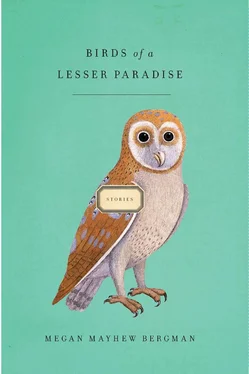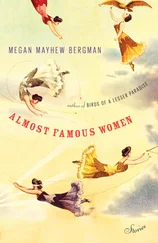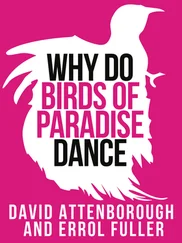As head volunteer of the Feed an Aye-Aye a Raisin program, I show up twice a week to manage a bucket of mealworms and raisins and a line of squirming kids.
Just push it into her mouth, I say, handing them a sickle-shaped worm.
I shudder every time Faye reaches for a grub with her extended middle digit, slender with a plump pad at the tip. She moves in slow motion, leaning forward on her perch toward the food, blinking as parents fire off rapid shots with their cameras. She trembles when excited kids push a worm at her too fast.
Thanks for visiting, I usually say, quickly ushering the gawkers from the aye-aye enclosure.
The older I get, the more I feel like Agnes Moorehead, a typecast grouch. All the good theater work she did overshadowed by Bewitched . I’d be pissed, too. But I try to be positive. I try to do the right thing, outpace my past. And I always hope something good is going to rub off on me at the center.
Faye is nocturnal. In order to reverse her sleep-wake cycle and keep her awake for the kids, the center illuminates the space at night. With the power down, the sun is streaming in. I don’t see her on the branch, so I figure she is asleep on her nest. The room is cold, so I take one of the pillowcases I’ve brought with me and drape it over her. She doesn’t move — Faye’s a deep sleeper.
I sit in the corner of Faye’s straw-lined room. There’s a large Plexiglas window where kids can watch Faye from the hallway and a long, two-pronged branch that hangs from ceiling chains. The room smells like a compost bin, like damp earth and fermenting fruit. I can’t see trees or the snowy lawn outside.
I cover myself with a sheet and fall asleep. I don’t know what time it is when I wake up. The sun has disappeared behind clouds and Faye’s room is cold and dark. I dig out my phone and try Leslie again.
Mom, she says.
I knew I wanted to call, but I didn’t know what I wanted to say. What are you doing? I ask.
Watching television with Zach, she says. Why are you calling so much?
I picture them in bed together, blank-eyed television zombies.
Look, I say. I think you should come home. Live with me for a while. Go back to school.
I need to go, she says. And I’m not going back to school.
Why? I ask.
Why what? she says. Why anything? It’s not worth my time. We have less than a year.
That’s a terrible way to live, I say. Thinking the world will end. You would know, she says.
The line goes dead.
I have a bag of roasted almonds in my coat pocket and I eat them slowly, one by one. Faye has not made a sound since my arrival, so I stand up, brush the hay from my pants, and go over to check on her. I place one hand on her back to feel her body rise and fall with her breath. She’s alive.
At the center, they tell us not to handle the animals more than we have to; it stresses them out. But today, I think, is something different, and all rules are off. No one is watching.
I carefully slide one hand underneath Faye’s body and lift her, gingerly, as if I am lifting someone else’s newborn. Her coat is rough. Her long tail curls around my arm. I take her to my corner of the room. She opens her large eyes, just for a moment, and squirms. I hope she recognizes me. I hope I’m able to comfort her.
I put my back against the wall and slide down, carefully, until I’m sitting with my legs out. I bring my knees up and press Faye against my chest, drawing my coat over half of her body. I can feel her breathing slow, her body warming.
I used to sit like this in my bathroom and smoke cigarettes. I would catch my eyes in the mirror and think: I smoke like Bette Davis. No one could smoke a cigarette sadder than Bette Davis.
I know I should check on the rest of the lemurs. I should call the head of the center. I should distribute blankets and record pulses and press gums and speak soft words of comfort. But here’s what I also know — my heart isn’t big enough. It never has been. If I look at the rest of them, I will break.
I tell the school kids who visit: In Madagascar, aye-ayes are often destroyed on sight. They’re considered an ill omen, death angels. In the wild they are fearless. When their habitat is ruined, they ransack plantations.
The kids say: Why? Why are they deadly?
It’s said they can pierce your aorta with their middle finger, I reply.
This is a showstopping lie, one that has been told for centuries by superstitious villagers. Faye treats the hoopla with nonchalance; after her feeding, the alleged killer sleeps in a knot in her nest like a house cat.
When I first met Faye, her yellow eyes reminded me of one thing — my dying father’s jaundiced eyes, his liver shot from decades of drinking.
Ryan met my father for the first time the month before we were married. He began to worry about my habits.
You’re predisposed, he said, looking at the mountain of beer cans in my father’s trash can. We have to be careful.
How is it that a drinking woman is sexy when she’s twenty, I said, and an alcoholic in her thirties?
I pretended to have learned something from my father, but I knew I was several miles down our shared road, an ugly biochemical pathway.
Even though I knew I would let Ryan down, I tried. We got married, then pregnant. We were happy, mostly. But I think there is a time in every woman’s life, a time in her thirties when she realizes she is past her prime. I’m not talking about the mind. Fuck the mind. The mind grows so sharp that it becomes the problem, sees the problem, sees it in men’s eyes. I’m talking about the legs, and the breasts, and the smile that used to open doors. I’m talking about the half-drunk swagger that could pluck a man from the bar, any man.
The way my jeans used to fit is what I’m talking about. The way everything smacked of sex, until it didn’t.
A year after the divorce, Leslie came to my place for one of her regular weekends. She was fifteen, into Guns N’ Roses. She had an older boyfriend, a seventeen-year-old Ryan was trying to chase off.
What’s new with you? I asked after Ryan dropped her off and brought her to the front door.
I’m in love, she said, but she said it in a way that was ugly and defiant. She was wearing a skirt that was too short and her nail polish was chipped. Her face was beginning to break out and she’d tried to cover the acne with foundation that was not her shade.
I didn’t know how to offer the motherly advice she needed, so I poured a drink. And then another drink.
She was sullen at dinner and afterward she fled to the guest room and played “November Rain” on repeat. For two hours I listened to her play that song.
For chrissake, I said, barging into her room, unable to take it. You’ll never be Stephanie Seymour, okay?
I look down at Faye’s sleeping body. Her scalp is visible through her coarse hair. Her tail drapes across my knees.
I pull my jacket back and kiss the crown of her head. The wiry white hairs on her neck bristle against my cheek. I hug her close, keep her warm.
I’ve always had trouble sleeping, and when I see deep sleep my first inclination is to be jealous. That kind of sleep is precious. When she was a toddler, I used to find Leslie dead to the world in the linen closet, a towel wrapped around her bare legs.
It was the kind of peace I could never find.
Sometime during what we call the middle of the night that is really the earliest part of the morning, I tuck Faye deep into my coat and leave the aye-aye house. I take a gravel path to the primary lemur enclosures, a square block of large cages pressed against each other to encourage companionship and play between the primates. There’s a roof over the cages, but the front panels are exposed to the elements, though a handful of well-intentioned, snow-logged tarps are draped over a few. It is a cursory inspection; I move fast. Some of the lemurs cling to each other through the adjoining cages for warmth. They are still, but alive.
Читать дальше












